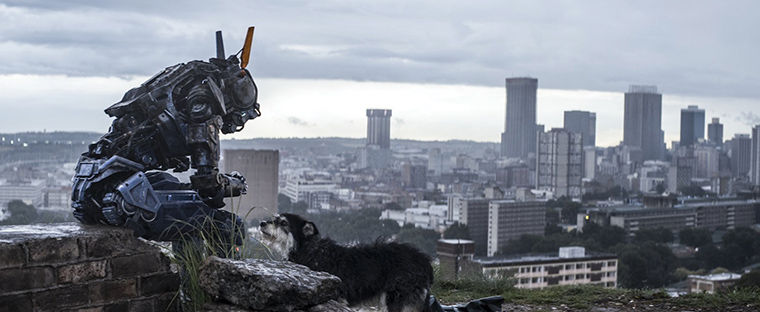‘Chappie’ not the brightest artificial intelligence
Neill Blomkamp’s third film, “Chappie,” follows in similar footsteps as his celebrated directorial sci-fi feature film debut, “District 9,” but fails to capture the same thrill.
March 16, 2015
Writer and director Neill Blomkamp exploded into the film industry with his Academy Award-nominated sci-fi thriller “District 9,” which created buzz and set high expectations for the young filmmaker. His third film, “Chappie,” has strong angles, but Blomkamp cannot seem to actually figure out how to effectively execute them.
Set in the year 2016, an all-robot police force is deployed in Johannesburg, South Africa, to control the rampant crime. The lead engineer of the company, Deon Wilson, played by Dev Patel (“Slumdog Millionaire”), has developed an artificial intelligence program that will allow the robots to acquire a consciousness. The company rejects Wilson’s program, but he installs it anyway inside a robot named Chappie. Chappie befriends a couple of gangsters, Ninja and Yolandi, played by rap duo Die Antwoord, and learns to cause trouble. With Chappie on the loose, engineer and soldier Vincent Moore, played by Hugh Jackman, takes matters into his own hands in order to destroy Chappie and sees the AI as not just a threat to humanity, but to his own personal gain.
Blomkamp is known for his use of special effects, and Chappie’s robotic self uses great computer-generated imagery. He is brought to life with meticulous detail, adding to his character. For example, he is taught how to be cool by Ninja and walks with a certain swagger that remains consistent throughout the film. Smaller details, such as Chappie rubbing his finger under hadhis nose should be as though he just done a line of cocaine, make Chappie all the better.
The film’s strongest element is Chappie himself. Voiced by one of Blomkamp’s regular actors, Sharlto Copely (“District 9”), he is likable from the moment he is activated. Unlike most AI characters, Chappie is a child at heart. He does not know how to speak at first, but he learns fast. He is quick to develop hopes, morals and fears, and soon questions the concepts of consciousness and having a soul. Chappie’s internal battery is slowly dying and cannot be replaced, which makes him fear death. Late in the film, Chappie becomes distraught at the concept of hurting others and seeks revenge when his friends are hurt.
As great as the central character is, the rest of the movie has problems. The fictional world is well established within the first 10 minutes, but the story is too complex for its own good. Blomkamp cannot decide which story is more important: Chappie’s character development as a robot or the conflict between Deon and Vincent. The two stories are mostly separate but collide in the finale for a typical blockbuster explosion. It is a bloody affair that lasts too long. Even the aftermath of the battle is absurd because Chappie does not actually learn anything substantial from the resolution of the conflict, weakening his character development.
It is a mystery why Blomkamp cast rap team Die Antwoord as two of the central leads—neither give a memorable performance. Instead, they deliver caricature versions of their stage persona. Unsurprisingly, their music is included on the soundtrack, which is mostly composed of an all-electronic, beautiful score by Hans Zimmer.
Whatever Blomkamp is trying to say about artificial intelligence makes little sense. His other films, “District 9” and “Elysium,” were both political satires dressed up as high-concept science fiction. “Chappie” is more of a brainless action movie than a satire, which is a shame considering many other movies, such as Ridley Scott’s “Blade Runner” and Spike Jonze’s “Her” have already successfully commented on the differences found between human beings and artificial intelligence.
“District 9” proved Blomkamp is capable of greatness, but he has yet to distance himself from his freshman feature. Still, the filmmaker has potential, even though nothing spectacular will come of “Chappie.”








